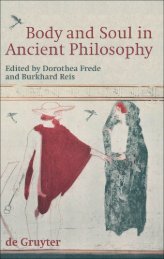Empedocles Redivivus: Poetry and Analogy in Lucretius
Empedocles Redivivus: Poetry and Analogy in Lucretius
Empedocles Redivivus: Poetry and Analogy in Lucretius
Create successful ePaper yourself
Turn your PDF publications into a flip-book with our unique Google optimized e-Paper software.
Introduction 15<br />
flammarum . . . iras, / . . . flammai fulgura → B115.10–11 δ’ ἐς αὐγὰς /<br />
ἠελίου φαέθοντος; air: 1.725 caelum → B115.11 ὁ δ’ αἰθέρος). 64 In the<br />
pages to follow we will come across many other <strong>in</strong>stances illustrat<strong>in</strong>g <strong>Lucretius</strong>’<br />
<strong>in</strong>tegration of <strong>Empedocles</strong>’ four-element theory <strong>and</strong> consider how he<br />
applies unified figurative language <strong>in</strong> his description of atoms <strong>and</strong> roots. 65<br />
Last but not least, Furley expla<strong>in</strong>s <strong>Lucretius</strong>’ lengthy praise of <strong>Empedocles</strong><br />
<strong>in</strong> terms of the latter’s physical theory about the r<strong>and</strong>om development<br />
of liv<strong>in</strong>g forms. We know from Aëtius (Aët. 5.19.5 = A72) that <strong>Empedocles</strong><br />
dist<strong>in</strong>guished four stages <strong>in</strong> the emergence of animal life. Although <strong>Empedocles</strong>’<br />
zoogonical account will be discussed below <strong>in</strong> more detail, 66 it would<br />
be useful to make here a few prelim<strong>in</strong>ary remarks. Accord<strong>in</strong>g to this theory<br />
creatures were first created by the accidental comb<strong>in</strong>ation of disparate limbs<br />
<strong>and</strong> organs that at an even earlier stage had sprung up <strong>and</strong> w<strong>and</strong>ered about<br />
on their own, without the <strong>in</strong>tervention of any div<strong>in</strong>e power; if the correct<br />
“limbs” comb<strong>in</strong>e, then the creature will survive <strong>and</strong> go on to found a species,<br />
but if the wrong comb<strong>in</strong>ation occurs then the creature will <strong>in</strong>stantly perish. 67<br />
<strong>Lucretius</strong> actually puts forward a theory very similar to <strong>Empedocles</strong>’,<br />
namely that orig<strong>in</strong>ally a set of r<strong>and</strong>omly composed monsters sprang up, of<br />
which only the fittest survived (5.837–877). It is true that there are clear<br />
differences between the two zoogonical accounts. Whereas <strong>in</strong> the very beg<strong>in</strong>n<strong>in</strong>g<br />
<strong>Empedocles</strong> describes isolated limbs (B57), <strong>Lucretius</strong> describes whole<br />
organisms with congenital defects. Besides, as Campbell remarks, <strong>Lucretius</strong>’<br />
system is different <strong>in</strong> that his maladapted creatures are formed at the atomic<br />
level rather than at the macroscopic level of whole limbs. 68 More importantly,<br />
<strong>in</strong> <strong>Lucretius</strong> there is no <strong>in</strong>ter-species m<strong>in</strong>gl<strong>in</strong>g of limbs, as happens<br />
<strong>in</strong> <strong>Empedocles</strong> (B61). That is why, as we know from Plutarch (Adv. Col.<br />
28.1123B), the Epicureans mocked <strong>Empedocles</strong>’ monsters some of which<br />
were described “roll-walk<strong>in</strong>g creatures with h<strong>and</strong>s not properly articulated<br />
or dist<strong>in</strong>guishable” <strong>and</strong> as “ox-headed man-creatures” (εἰλίποδ’ ἀκριτόχειρα<br />
καὶ βουγενῆ ἀνδρόπρῳρα, B60; cf. B61.2).<br />
At this po<strong>in</strong>t, one could claim that <strong>Lucretius</strong>’ primary source for this<br />
theory might have been Epicurus’ On Nature (Books 11 <strong>and</strong> 12), 69 which<br />
<strong>in</strong> turn <strong>in</strong>teracts with <strong>and</strong> argues aga<strong>in</strong>st Plato’s Timaeus, s<strong>in</strong>ce the latter<br />
text appropriates <strong>and</strong> subverts the Empedoclean <strong>and</strong> Democritean zoogonical<br />
doctr<strong>in</strong>es. 70 However, we should not deny the fact that the whole Lucretian<br />
passage <strong>in</strong>disputably echoes <strong>Empedocles</strong> <strong>in</strong> terms of both theory <strong>and</strong><br />
language. 71 That is why, after mak<strong>in</strong>g such an <strong>in</strong>tensive use of <strong>Empedocles</strong>’<br />
poem <strong>and</strong> attack<strong>in</strong>g the compound creatures of myth, <strong>Lucretius</strong> also argues<br />
that the compound creatures of <strong>Empedocles</strong> never existed at any given<br />
time; he thus makes sure that he keeps his distance from his predecessor






![[Niall_Livingstone]_A_Commentary_on_Isocrates'_Busiris](https://img.yumpu.com/51449110/1/163x260/niall-livingstone-a-commentary-on-isocrates-busiris.jpg?quality=85)

![[Richard_Sorabji]_Self__Ancient_and_Modern_Insigh(BookFi.org)](https://img.yumpu.com/30857691/1/174x260/richard-sorabji-self-ancient-and-modern-insighbookfiorg.jpg?quality=85)




